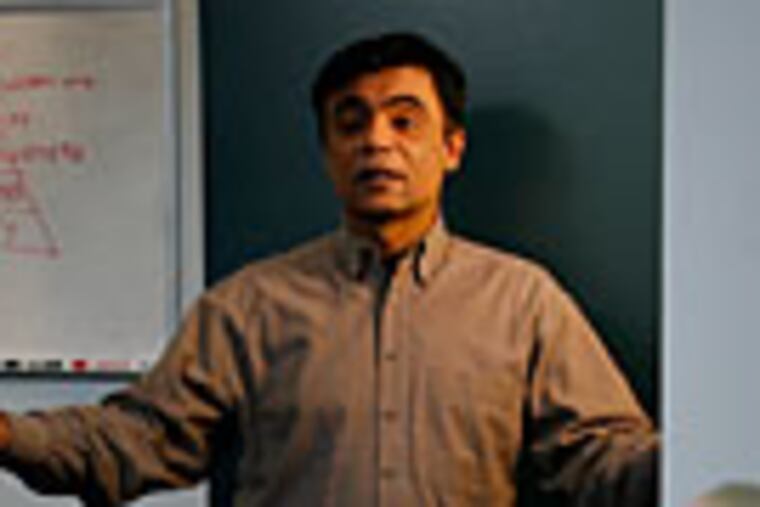Kenexa can quantify everything - almost
Because Kenexa Corp. loves measurement, especially when it comes to quantifying the unquantifiable, it even has a formula for assessing whether its clients will renew their contracts.

Because Kenexa Corp. loves measurement, especially when it comes to quantifying the unquantifiable, it even has a formula for assessing whether its clients will renew their contracts.
Two of its elements:
Does the Kenexa sales representative know the names of his client's spouse and children? A yes equals 0.5 points.
And: In the last year, has that Kenexa rep spent four consecutive hours with his main contact at the client company? All-day conferences don't count. It has to be in a group of six or fewer.
Sitting in his Wayne headquarters office, Noorudin "Rudy" Karsan, Kenexa's cofounder and chief executive, grabbed a pen and a tablet of graph paper (of course it was graph paper) to show off the rubric.
"We can predict the renewability of our contracts," he said. "We have an objective measure."
In some ways, the formula that Karsan etched out, illustrating it with a pyramid and various lines and arrows, has little to do with Kenexa's three main businesses.
The 1,400-employee firm sometimes acts as an outsourced recruiting department for companies, hiring and orienting employees. It also designs software to facilitate the hiring, orienting, training, and exit processes.
Finally, from Kenexa's facilities in Lincoln, Neb., it develops a mountain of employee survey data, devised and analyzed by a staff that includes 20 experts with doctorates in organizational development. The issues they ponder: What measurable attributes will the best hires have? What are the best behaviors for managers in a crisis? What keeps employees engaged? What turns them off?
That's why it's no surprise that Kenexa has created a survey to measure its own success in retaining clients.
Clients rate Kenexa on five attributes, including accuracy, timeliness and mutual learning, with points awarded for each. Kenexa's account representatives rate themselves on the strength of their relationships with their client contacts.
A mathematical formula is applied to the scores. "If we get under 9, we don't have a chance of keeping the business," said Karsan.
When it comes to keeping business, Kenexa, like other human resources and staffing companies, has taken a hit in the recession. No one needs recruitment software when no one's hiring.
In 2008, the publicly traded company reported revenue of $203.7 million, compared with $181.9 million the prior year.
But, Karsan said, revenue has declined 20 percent since then, and the company laid off about 300 from its peak employment in the second quarter of 2008.
In 2008, the company lost $104.7 million - mostly as a write-down of some acquired assets. Operating income was $24.8 million, down from $31.0 million the prior year.
"It's been tough, but manageable," Karsan, 52, said of Kenexa's response to the global economic slump. "Given my age, I've seen a lot of stuff, but this is the worst I've ever seen.
"There's a lot of anger and frustration," which is the by-product, he said, of uncertainty "driven by a lack of control."
The best managers, Karsan said, respond with constant and truthful communication.
From talking to Kenexa's 4,000 clients, which have employees in 200 countries, Karsan said, he is seeing an increasing trend toward paying for performance.
His clients will boost base salaries by just 1 percent to 1.5 percent, he said, but performance bonuses may be in the double digits. "We expect a higher level of bonuses, which give companies the flexibility to make payments if goals are reached," he said.
Centuries ago, workers were paid for how much they produced, with no connection to how much time it took. But in the last century or so, the rise in the service economy and the bureaucracy of government created a time-based compensation system that is now changing.
"Freelancers are getting paid piecework" for their articles in magazines. Doctors are getting paid more if they adhere to performance standards, he said, listing a few examples. "It's a societal change."
These days, Karsan said, he is seeing inklings of encouragement in the economy, as reflected in his company's performance.
Its 2009 third-quarter revenue, down 25 percent from 2008's third quarter, was still better than 2009's second quarter, although not by much. And the company is beginning to hire.
"The juice is going to come from the infrastructure and it's going to come from tax dollars," he said. "We're going to pass on the debt to our children so there won't be social unrest. We're going to go through an evolution, rather than a revolution.
"I think it's smarter for society short-term. Long-term, I don't know."
Maybe, finally, Karsan has met something he can't measure.